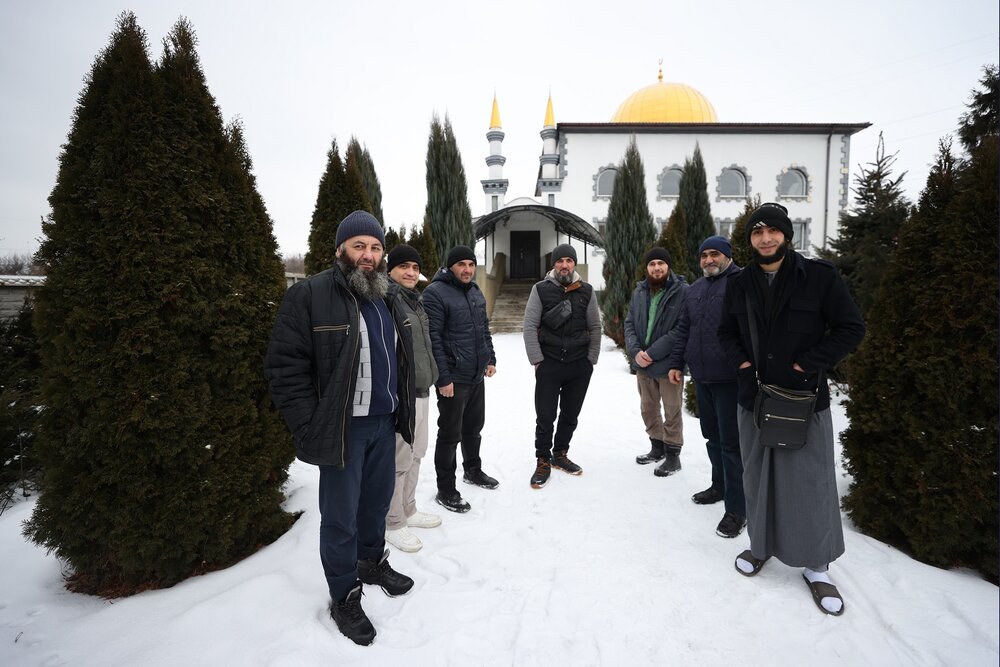Hawzah News Agency –The Muslim community of the town of Kostiantynivka in eastern Ukraine is still hopeful for "peace and goodness" amid the recent escalation of tensions in the region.
Though the industrial town in the Donbas region fell into the hands of pro-Russian separatists for a time in 2014, the Ukrainian army later managed to regain control.
Vitaly Koritsky, a Ukrainian man born and raised in the city of Slovyansk in the northern part of the Donetsk region, told Anadolu Agency that he met his future wife of Turkish origin in the same city. Both later converted to Islam in Donetsk city, moving to live in Kostiantynivka.
Koritsky, 31, said the situation "worsened" in 2014, when pro-Russian separatist groups invaded parts of eastern Ukraine, adding that none of the town's residents fled elsewhere as "there was no other place to go."
He underlined that the Muslim community in the area has faced regular threats during the conflict.
"We got used to all these things for so many years, we've seen both war and shootings ... Of course, we'd like peace and goodness, as it was before, when there were no problems and people were living better," Koritsky said.
"By the will of Allah, may everything be good and may there be no fighting," he added.
Political situation affects all
Avaz Shiraliyev, a 62-year-old businessman with roots in Azerbaijan who has resided in Ukraine for over 30 years, said the Muslim community in Kostiantynivka has grown in number compared to what it was a decade ago, when a few people started to construct the town's first mosque out of their own pockets.
Shiraliyev, who is also the head of the Bulag Association of Muslims in Kostiantynivka, said that though nearly 1,000 Muslims live nearby, only about 60 families actively take part in their community's affairs.
He underlined that currently, the general situation was "fine" in his area, adding that he was not sure how the ongoing tensions with Russia would play out.
"The political situation, to some extent, affects the life of every person, including economically, financially, employment-wise, and the livelihood of the people," he said, noting that before the conflict, the nearby cities of Donetsk and Luhansk had provided more employment opportunities.
Shiraliyev emphasized that the town's Muslim community has "very good, respect-based mutual relations" with their neighbors and locals.
'Everything will end quietly, peacefully'
Abdullah Taibov, 66, is another Kostiantynivka resident who said that "so far, no Ukrainian or Russian offended" him and that he lives in harmony with the local people.
"We live with good neighborly relations with everybody. We live with a full sense of respect and always help one another," said Taibov, an ethnic Lezgin from the Dagestan region of Russia. He has lived in Ukraine for nearly five decades.
On the situation of the Muslim community in the area, Taibov said they had purchased the land on which to build their mosque early in 1986-1987. By working together and with the help of several people and organizations, he said, they managed to build their first mosque, where many of the area's Muslims gather for prayers, special occasions, and holidays.
Taibov noted that after the fighting broke out in 2014, friends who had previously lived in Donetsk city returned to areas under Ukrainian government control after living conditions deteriorated in places seized by the pro-Russian separatist groups.
He was, however, hopeful that the border tensions with Russia will be resolved, saying: "I think that, by the grace of Allah, nothing bad will happen. We don't want anything to happen ... I think it (the conflict) will pass by us."
"I think every normal person would always want peace, especially Muslims ... We wish for peace and goodness upon all," Taibov added.
Recalling how, in 2014, they witnessed gunfire and rockets flying overhead, Taibov said: "May this war end as soon as possible. There's nothing good about it ... I think everything will end quietly and peacefully."
Russia recently amassed tens of thousands of troops near Ukraine's eastern border, prompting fears that the Kremlin could be planning another military offensive against its former Soviet neighbor.
Moscow has denied that it is preparing to invade and said its troops are there for exercises. It has also issued a list of security demands, including that Ukraine does not join NATO.


Your Comment